On The Town…With Chip Deffaa…Sept 9, 2017
I was saddened, too, by the passing of Barbara Cook. She was a sublime artist. She had the most glorious soprano voice I've ever heard. And she was a master interpreter of our greatest songwriters. No one sang Sondheim better.
No living Broadway producer/director has accomplished more than Hal Prince. He’s won 21 Tony Awards in his career. (No one has won more.) He deserves every honor, accolade, and award he can get. I’m very glad that there’s a celebration of his work on Broadway right now.
The Manhattan Theater Club’s production of “Prince of Broadway,” which opened August 24th at the Samuel J. Friedman Theater, offers a look back over Prince’s career, from the 1950s to the present. Co-directed by Prince and Susan Stroman (who also choreographed the production), this revue features a whopping 35 musical numbers from 16 Broadway shows that were produced and/or directed by Prince, plus a new closing number, written expressly for the production by Jason Robert Brown. Prince certainly merits a grand salute.
Because I have such great admiration for Prince–and because his productions have given me such great joy throughout my life–“Prince of Broadway” is a show that I very much hoped to love.
And because the people putting this show together are all such consummate professionals, and because this show includes numbers by many of Broadways all-time great composers and lyricists, I went with high hopes.
But things don’t always turn out as well as you might hope. And maybe even top professionals–the best in the business–can be too close to a project to perceive its problems.
* * *
There are moments, in “Prince of Broadway,” of sheer theatrical brilliance. Numbers so wonderfully executed that I’m certainly glad I went to see this show. And I can recommend “Prince of Broadway,” with reservations, to all who love musical theater. You’ll see some terrific artists, doing some terrific numbers. Beowulf Boritt’s sets, evoking the shows being remembered, are often just right.
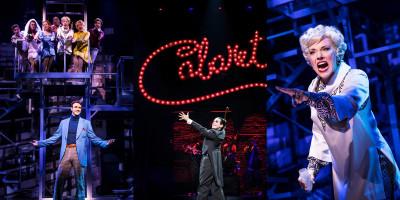
Prince of Broadway
The nine-person cast of “Prince of Broadway” works hard, and relentlessly…. for what–to me–feels like a very long time.
Despite some absolutely dazzling scenes, this show as whole did not work for me nearly as well as I’d hoped it would. And I felt like I’d pretty much had my fill, long before the show was over.
To me, it felt like they were trying to do too much, trying to jam too many hard-hitting musical numbers into one evening, with virtually no dialogue to set anything up, help us get to know Prince, or even simply offer a much-needed respite. After a while–for me, at least– it was just sensory overload. It stopped being fun. Everyone involved seemed to be trying so hard, pushing so hard. And—for my tastes–it simply all got to be too much.
There were warning signs, early on, that the show was not going to work as well as I’d hoped. Take the overture. We were served snippets of no less than 17 different numbers–everything from “Tradition” (from “Fiddler on the Roof”), to “Wilkommen” (from “Cabaret”), to “The Music of the Night” (“Phantom of the Opera”), to “She Loves Me” (from “She Loves Me”), to “The Blob” (“Merrily We Roll Along”), to “Maria” (“West Side Story”), to “ ”The Ballad of Sweeney Todd”( “Sweeney Todd”), to “I’ve Got it All” (“On the 20th Century”). I’ve named less than half the numbers included in the overture and already I’m getting tired. So many disparate numbers–numbers that I have long loved individually–offered in snippets so damned brief, it grew more and more frustrating. You barely had time to even identify what was being played before the orchestra rushed on to something different. I wanted to call out: “Stop! Stop! Give me a moment to catch up.” There was no time to savor anything.
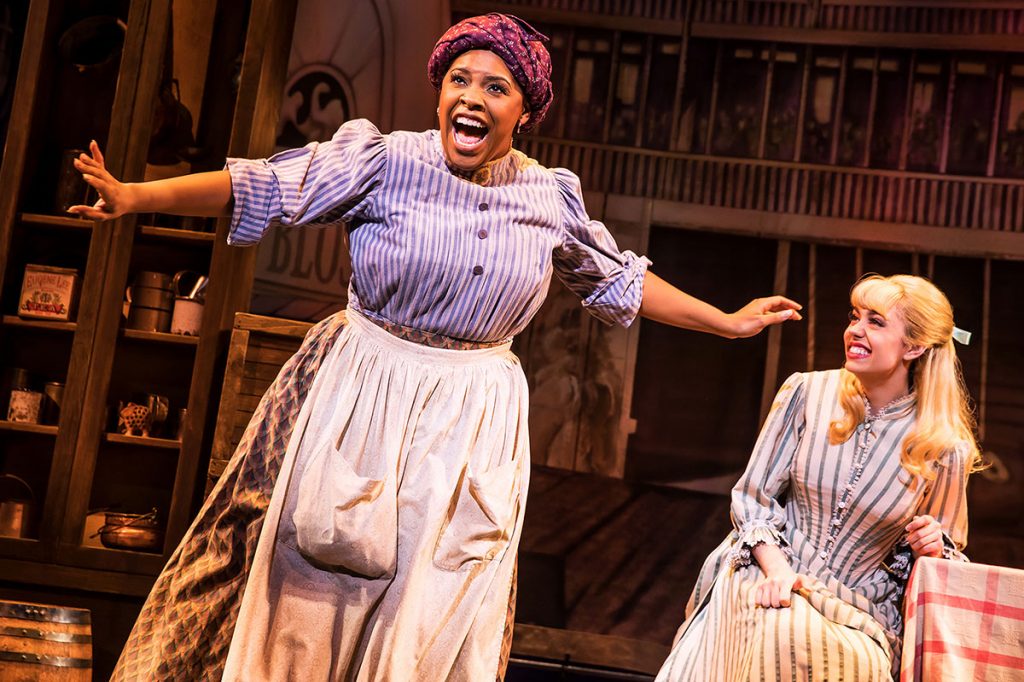
Bryonha Mmarie Pparham and Kaley Ann Voorhees
You don’t have to squeeze the entire show into an overture. And you shouldn’t. Think of the overtures to “Gypsy,” “My Fair Lady,” and “Funny Girl”–to name three truly first-rate overtures. The great musical-theater overtures give you enough of the key songs for you to enjoy the melodies, and to appreciate the character of each song. And there’s drama, and contrast. Those overtures are so well-constructed, they’re like little concertos.
This overture, however, felt way too “busy.” I understand the desire to fully represent Prince’s oversized career. But you really have to figure out what to leave out. A lot less would have been a lot more. And maybe you want to feature, in the overture, numbers that the orchestra you have can play most satisfyingly.
During the overture, the 15-piece orchestra often sounded too “small” to me. Not that a 15-piece orchestra, in the abstract, is necessarily small. (You could do a terrific big-band type of show, for example, with 15 well-chosen musicians. And many other shows.) But this orchestra was notably smaller than the orchestras in the original Broadway productions of some of the iconic shows–like “Fiddler,” “West Side Story,” and “Phantom”–that it was trying to conjure up, and it could not produce as lush and full a sound as theater buffs associate with those shows. So hearing this 15-piece orchestra, during the overture, play some themes that sounded far better in the original Broadway productions was something of a let-down. And did not augur well for the show we were about to see
I understand there are budgetary constraints. I get that. (I give the Manhattan Theater Club credit for coming up with the funds for even 15 musicians. And for being able to mount this show at all after so many commercial producers, sadly, reportedly passed on it.) And I don’t envy anyone tasked with creating an overture for this big revue. Shows as different from one another as “Cabaret,” “Phantom,” “She Loves Me,” and “Fiddler” call for different types of orchestras and different types of orchestrations.
But first impressions matter; and the cluttered, eclectic overture–with an orchestra that sometimes sounded too small for what it was being asked to do–struck me as a worrisome harbinger of things to come.
As the music played,. titles of shows that Prince had produced and/or directed were projected–one after another, after another, after another, after another….. It initially seemed like a good idea; but again, it soon wound up feeling like overkill. They’re trying to tell us that Prince was great? We got the point. But the titles kept coming at us–eventually with diminishing impact. “Wow! He not only gave us ‘Fiddler’ and ‘Follies’ and ‘Cabaret’…. he also gave us ‘Tenderloin’?” And now maybe you’re trying to remember…. What was “Tenderloin”? And that’s a needless distraction. And made me a bit uneasy.
Fortunately, there are some truly great scenes in this revue.
The musical numbers, early on, tended to charm me. And some sequences were damned near perfect. My God! The evocation of “Cabaret”–which Prince originally produced and directed in 1966; that success established him as a director–could not have been better!
Brandon Uranowitz was a perfectly marvelous Emcee. The showmanship, the flair, the feel for the part! He carried it off well. And I’m exceedingly hard to please when it comes to “Cabaret.” It’s one of my favorite musicals, and I’ve seen it many times with many different actors–some great, some good, some terrible. The best Emcees I’ve ever seen do the show on stage, over the decades, were Joel Grey, Jon Peterson, Alan Cummings. I’ve seen some well-known television actors attempt the role and simply fall flat. It is one very tough role. But Uranowitz won me over. I’d love to see him in a full production someday, directed by Prince–doing the original version of “Cabaret,” which would be nice to see again.
Uranowitz sang “Wilkommen” and “If You Could See Her,” and it was just great. Utterly winning, and on target. Then Karen Ziemba–who can always be counted on to offer ample rewards–put her own stamp on “So What.” No, she did not erase the memory of Lotte Lenya, who really owned that song and brought a wealth of life-experience to it. (Lenya actually lived in Germany in the era depicted in “Cabaret”; she was married to master composer Kurt Weill, whose music was a source of inspiration for Kander & Ebb in “Cabaret.”) But Ziemba was strong and credible, and intriguing.
Finally, Bryonha Marie Parham put over the song “Cabaret” with tremendous panache; I’ve never heard anyone anywhere, save Liza Minelli, find more in that song. Parham got the night’s biggest hand, and brought the first act to a sensational close. It’s good they had an intermission right then and there; no one could have followed her. In the second act, Parham impressed wonderfully, also, singing “Can’t Help Lovin’ that Man of Mine,” from “Show Boat.” (And this was one of many numbers when the arrangements and orchestrations, by Jason Robert Brown, served the material superbly, with the right plunk-plunk-plunk period feel.) I enjoyed very much Stroman’s choreography there, too. Chuck Cooper sang “Ol’ Man River” with compelling dignity and conviction; I felt almost as if I was hearing it for the first time. I must say, Cooper added much to the show, throughout the night. Terrific presence. And strong acting chops. Even in scenes where he had very little to do (such as “Company”), he made every word count. A wonderful player.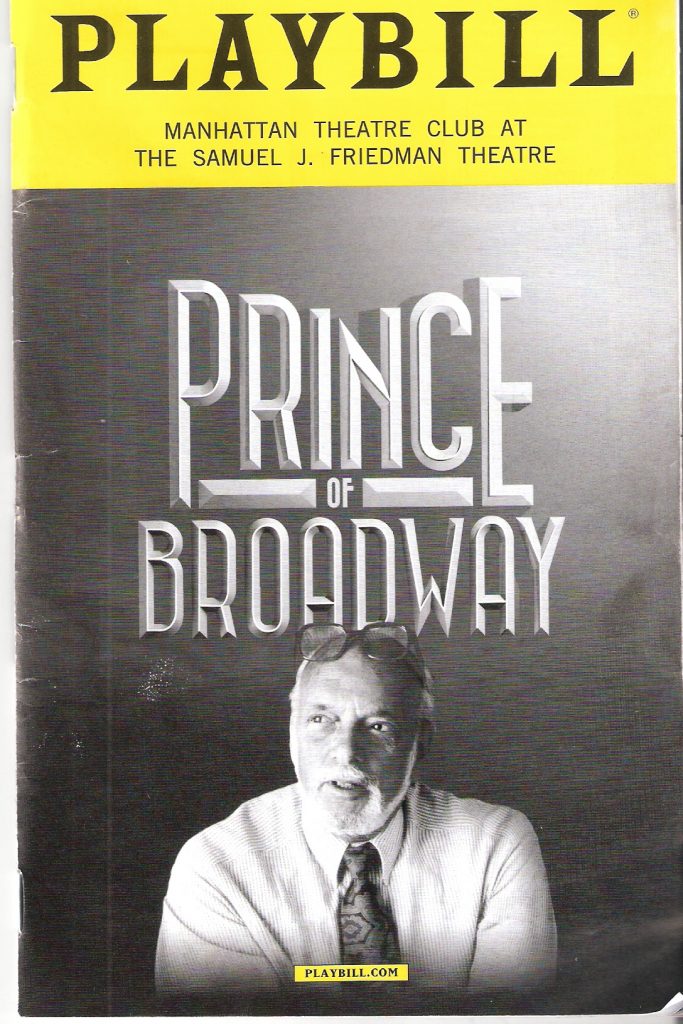
Tony Yazbeck made a number of memorable contributions. He was particularly effective–soaring, tender, heartfelt–singing (as “Tony”) “Something’s Coming” and “Maria” in the “West Side Story” sequence; and then, joined by Kaley Ann Voorhees (as “Maria”), singing “Tonight.” Just beautiful. My heart stopped.
The above-named sequences–saluting “Cabaret,” “Show Boat,” and “West Side Story”–were not only high points of “Prince of Broadway,” they were high points of my theater-going experiences in recent years. They were carried off beautifully.
There were other numbers I enjoyed, too, from “Heart” (“Damn Yankees”) to “If I were a Rich Man” (“Fiddler on the Roof”).
But gradually, “Prince of Broadway” began to tax my patience. We were presented with one boffo musical number after another, and then another, and then another, and another without anything meaningful connecting them. And a kind of fatigue set in for me. I’m going to give an analogy; it’s not perfect but it’s close enough, I think, to get my point across.
Imagine you have a favorite restaurant. You’ve been there many times over the years, and each meal is exquisitely prepared, from appetizer, to main course, to side dishes, to dessert. The restaurant has given you many wonderful memories. Then one night, you go in and the owner says, “We have a special treat for you tonight. For the next two and a half hours, we’re going to serve you nothing but desserts–one dessert after another, all of the great desserts you’ve enjoyed so much over the years, one after another.” The first dessert is great. The next is almost as satisfying. After a certain point, though, you’ve had more than enough. Really! You want to leave. But the owner says, “Wait! The best is yet to come. You thought the first 17 desserts we’ve served you tonight were good? The next 18 will be even better. You can’t leave until you’ve eaten 18 more desserts.”
Watching “Prince of Broadway,” I felt, after a certain point, like I was being force-fed 35 desserts, without being given a chance to rest, or at least cleanse my palate a bit. Nine performers, donning all different costumes, kept re-creating–as best they could–scenes from one fondly remembered musical after another, to diminishing returns.
The singing actors were all pros. And I respect them. Sometimes they were asked to play roles for which they were well suited, sometimes not. I felt sorry for the poor fellow–a solid, versatile, journeyman player–who was asked to represent a star of “A Little Night Music” in one scene; the star of “Phantom of the Opera” in another scene; and the star of “It’s a Bird, It’s a Plane, it’s Superman” in still another scene. He would not have been a director’s first choice to play any of those varied roles. (It reminded me of the year a friend of mine got hired to do assorted shows at the Pocono Playhouse and the Bucks County Playhouse; one week I got to watch him play a Russian Jew in “Fiddler on the Roof”; a couple of weeks later, I was supposed to buy that he was Siamese royalty in “The King and I”; he was a likeable-enough singing actor who wasn’t really ideal for the various roles he played that summer.)
In a great book musical, the dialogue helps set up the songs, and enables the songs to pay off powerfully. “Prince of Broadway” (with book credited to David Thompson) has brief, perfunctory bits of dialogue–skimpy, unrevealing snatches of recollections by Prince. I would have welcomed more talk and fewer musical numbers–both to help us understand Prince better and to allow us to appreciate the musical numbers better. The songs should be showcased better.
By the time the “Show Boat” sequence was over, I felt satiated. I was looking at the program, and counting how many musical numbers still remained (11!). I could not properly evaluate those last 11 numbers; by that point, my ears simply felt full.
I’m wondering, too: Who’s the ideal audience for this revue? Is it someone like me, who’s known and loved virtually all of the various shows being excerpted? I’d watch numbers in “Prince of Broadway” and remember the original Broadway productions. And sometimes the current performers disappointed me because they were perhaps merely good, and I couldn’t help but compare them with a great performer whom I remembered singing the number years ago.
I’m sure that theater-goers who have not been seeing shows for as long as I have might have enjoyed Emily Skinner’s rendition of “The Ladies Who Lunch.” But I didn’t care for it; to me, her performance seemed like a pale imitation of that of Elaine Stritch, whom I saw introduce the number in the original Broadway production, and then perform it many times in later years, in clubs and concert hall. Stritch–wry and arch and knowing–truly owned that number. Skinner was trying to approximate Stritch’s performance, and for me her singing had s kind of “ersatz” quality to it.
Is the ideal audience someone without much theater-going experience? Over the years, I’ve often taken a young niece or nephew to see shows with me, trusting that you can enjoy any show for its own sake. But I’m quite sure some moments of this show would have puzzled a young niece or nephew. In “If You Could See Her” (from “Cabaret”), the Emcee is dancing with a gorilla; he concludes the number with the ugly words, “If you could see her through my eyes…. she wouldn’t look Jewish at all.” In the context of “Cabaret,” that Fred Ebb lyric is a devastating example of Nazi anti-Semitism. But if I were to take a young niece or nephew to see “Prince of Broadway,” in which the number is performed out of context, without any proper setup, the number would be confusing, and call for an explanation.
“Company” is a brilliant musical. I enjoyed the original production, a subsequent Broadway revival, and more. The song “Being Alive” pays off powerfully in “Company” because everything preceding that number has been preparing us for that moment. If you take the song out of context, you rob it of some of its power. Michael Xavier, who sings “Being Alive” in “Prince of Broadway,” certainly has greater technical skills as a singer than the performer I saw star in “Company” a few years ago at the Bergen County Players (a popular community theater in northern New Jersey). And yet I was affected more by the Bergen County performance. Why? Because the original context (the whole show–the strong book by George Furth and strong score by Sondheim) helped give the song greater weight and import.
Well, that’s enough grousing about “Prince of Broadway.” I hate complaining so much about a show that has some truly outstanding moments. But my feelings towards “Prince of Broadway” are quite mixed.
Watching “Prince of Broadway,” I found a good bit to enjoy, and I took my pleasures where I good. (Boy! Drummer Jamie Eblen repeatedly impressed me with his contributions, too; and Brown’s orchestrations gave him plenty of chances to add accents and emphases, and make big moments bigger, and help with transitions.) But I simply felt overloaded by “Prince of Broadway,” well before the night was through. I couldn’t fully appreciate the final numbers; I was just satiated.
I’ve seen other tribute-type shows, offering similar sorts of material–such as “Sondheim on Sondheim”–do a much better job, in terms of structure and variety, to keep the evening interesting from start to finish. And to keep me wanting to know more, and hear more, and see more.
I’ve seen masterfully paced Broadway revues–“Black and Blue,” which I went back to see time after time, was brilliantly constructed–where the director knew just how to have a quiet moment follow a big brassy one, how to throw in enough dancing or humor to change the feel of the show after some potent, in-your-face singing. But the pacing was “off” here.
The night I attended “Prince of Broadway,” the audience applauded warmly at the very end–but with less passion than at the end of Act One. The company got to do a simple curtain call. But there was none of the clamoring for more that I think they might have had, had the creative team done a bit of judicious cutting and re-arranging, and tried interspersing more dialogue, of a more meaningful sort. The show could have–and should have–worked better.
I would have welcomed hearing some of Prince’s own voice somewhere, too, whether “live” or pre-recorded. It would have given us more of a connection with the man. If they eventually adapt this presentation for television–which I’d love to see happen–adding commentary by Prince himself would be a most welcome touch. I’d go see “Prince of Broadway” again, both to see some of the peak moments again–Uranowitz and Parham really knocked me out– and to view again some of the numbers, particularly in the later part of the show, that I simply could not absorb properly the first time, because I’d felt overwhelmed.
* * *
The Broadway musical “Anastasia” was, for me, pleasantly enjoyable from beginning to end. It held my interest. The show was professional on all counts–the writing, the acting, the singing, the staging. It’s a charming divertissement, handsomely mounted. And I’m very glad I saw it. It’s a musical that the whole family could watch together, from young children to parents and grandparents. And I left smiling.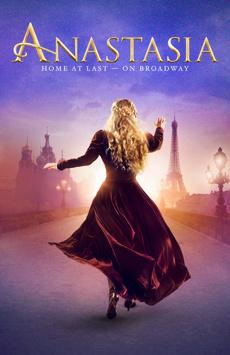
The songs, by composer Stephen Flaherty and lyricist Lynn Ahrens, are melodic, attractive, romantic, easy on the ears; they often have the sweet, slow, vaguely sentimental feel of something you might have heard from a music box long ago. I always like Flaherty & Ahrens’ work. It’s appealing. But this score does not have as much variety or complexity as some of their others.
The book, by Terrence McNally–another writer I very much like–is well-constructed, offering just enough suspense to keep you hooked from beginning to end. We follow with interest the story of the humble street sweeper who may or not be, in reality, the heir to the Russian throne. It’s a Cinderella-type of story, deftly told; and we want to believe that the street sweeper actually is Anastasia, the only surviving child of the late Czar.
This well-produced musical, directed with a steady hand by Darko Tresnjak, offers neither the highs nor the lows of “Prince of Broadway.” The performances by the stars are admirable, but not thrilling. The show maintains an even keel from beginning to end. Watching it is a very agreeable way to pass the time. It’s not a show I’m dying to see again. It’s well done, and a nice escape from the hassles of everyday life.
Christy Altomare does a fine job in the title role. She is beautiful, sincere, earnest, idealistic, with a heart of gold–the kind of character you might welcome as a loyal friend or spouse in real life, but not necessarily the most interesting character to observe on the stage. Her diction is crystal clear; her intonation is impeccable; she hits the high notes with grace and ease; and she is eminently likable. She is surrounded by equally solid, but not spectacular, players: Derek Klena, John Bolton, Ramin Karimloo, Mary Beth Peil. I liked all of them–they played their parts well– without being dazzled by any of them.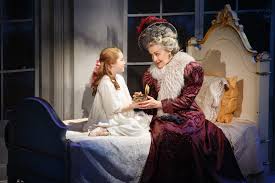
The performance I enjoyed the most was that of Caroline O’Connor (“Countess Lilly”). She was a real character, with personality, and a terrific comic sensibility. She added some much-needed pizzazz and comic relief. And she got to put over the most spirited number in the production, “Land of Yesteryear.” What a great kick I got out of her work!
I appreciated, too, the scenic design of Alexander Dodge, and the projections of Aaron Rhyne; I thought this show employed projections about as well as any show I’ve ever seen.
Was it all I hoped it might have been? No. It felt a bit simplistic to me. Everything was on the surface. A good story, told well. But without a great show’s “something extra” that might make you think, or reflect, or dazzle you, or
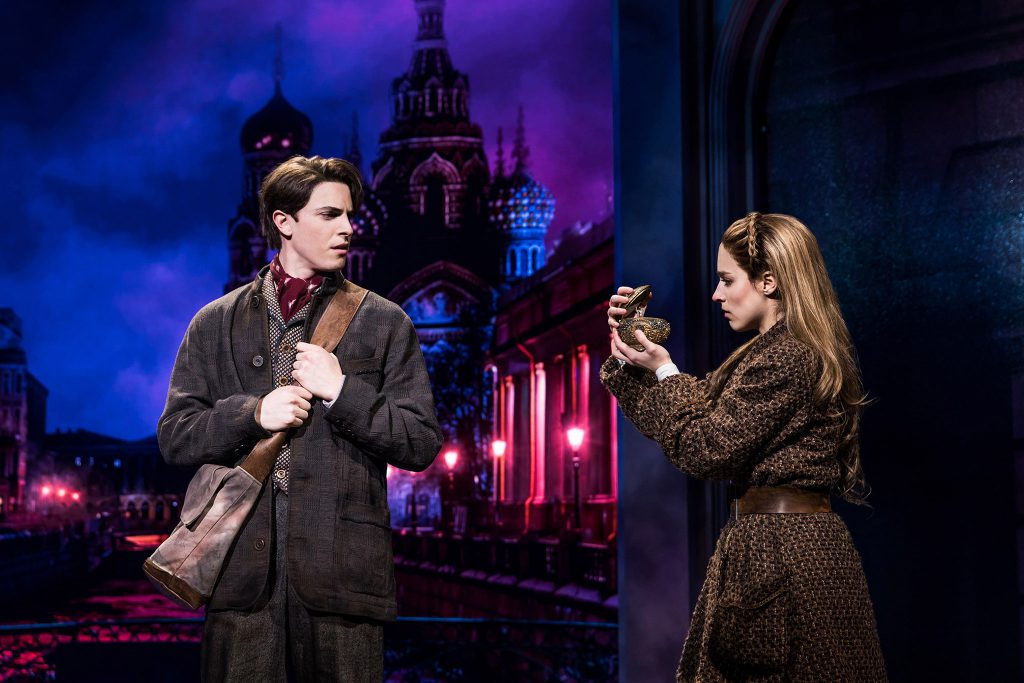
Derek Klena and Christy Altomare
compel you to see the work again. “Anastasia” is the product of the same creative team–Flaherty & Ahrens, and McNally–that gave us “Ragtime.” But “Ragtime” is a profound work, richly layered. When I saw the original Broadway production of “Ragtime,” I felt enriched, moved, provoked. I knew I wanted to see it again, and again. And I did go back to see it again, and again. “Anastasia” is a fine show–professionally crafted from beginning to end. The house was packed at the performance I attended, and audience members of all ages appeared to be enjoying themselves. But it is a smaller and simpler show
than some shows Flaherty & Ahrens, and Terrence McNally have given us.
* * *
I want to note the passing, in the past month, of two individuals who were–in their own ways–major contributors to the theater world.
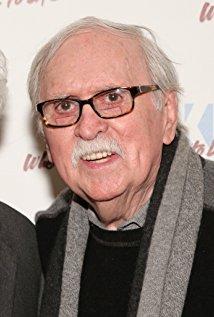 Thomas Meehan was a wonderful writer (and a very well-liked man)–one of the very few writers who really knew the secrets to creating effective musical comedies. He wrote or co-wrote the scripts to such memorable Broadway shows as “Annie,” “Hairspray,” “The Producers,” “Cry-Baby,” “Elf,” “Chaplin,” “Young Frankenstein,” “Rocky,” and more. And there was always a great deal of heart in his writing. And a great sympathy for the underdog. And a lot of love. If you compare any show Meehan wrote or co-wrote–from “Annie” to “The “Producers”–with the original source material he was drawing upon, you can see he strengthened the bonds between characters, made strong feelings of love and friendship more of a motivating factor. His “Daddy Warbucks” was far warmer and more loving and human–at least by show’s end–than the original in the comic strip. Bialystock and Bloom bonded much more closely and tightly and supportively in his version of “The Producers” than in the original. And that was a reflection of who Meehan was.
Thomas Meehan was a wonderful writer (and a very well-liked man)–one of the very few writers who really knew the secrets to creating effective musical comedies. He wrote or co-wrote the scripts to such memorable Broadway shows as “Annie,” “Hairspray,” “The Producers,” “Cry-Baby,” “Elf,” “Chaplin,” “Young Frankenstein,” “Rocky,” and more. And there was always a great deal of heart in his writing. And a great sympathy for the underdog. And a lot of love. If you compare any show Meehan wrote or co-wrote–from “Annie” to “The “Producers”–with the original source material he was drawing upon, you can see he strengthened the bonds between characters, made strong feelings of love and friendship more of a motivating factor. His “Daddy Warbucks” was far warmer and more loving and human–at least by show’s end–than the original in the comic strip. Bialystock and Bloom bonded much more closely and tightly and supportively in his version of “The Producers” than in the original. And that was a reflection of who Meehan was.
Meehan wrote for film and TV, and for the “New Yorker” magazine, in addition to theater. But theater was always his favorite medium.
I loved one inside joke that he snuck into the script of the Broadway musical (and its subsequent film adaptation) “The Producers.” When Bialystock and Bloom pay a visit to the home of the man they believe to be the world’s worst playwright, they mention the man’s address–and the address they mention was the real-life address of Meehan himself! That line always made me smile. Years ago, I used to like buying things from the nearby shop where Meehan’s wife worked (“Peanut Butter and Jane”)–I had such admiration and appreciation for Thomas Meehan, it extended to his wife as well. He was 88.
* * *
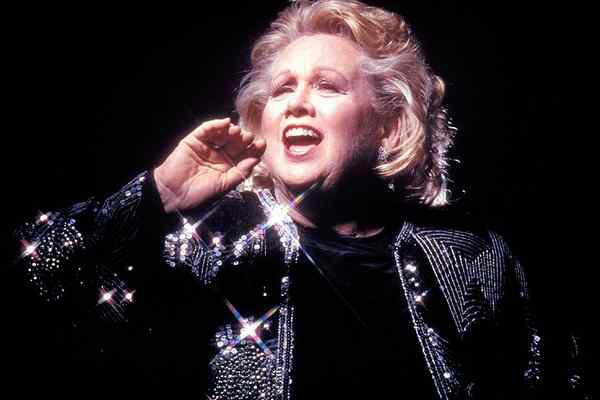
Barbara Cook
I was saddened, too, by the passing of Barbara Cook. She was a sublime artist. She had the most glorious soprano voice I’ve ever heard. And she was a master interpreter of our greatest songwriters. No one sang Sondheim better. In the first half of her career, she was a top leading lady in musical theater, famously originating roles in such Broadway shows as “The Music Man” and “She Loves Me.” (Decades later, she could still sing for me at her home lines of “My White Knight” that had been cut from the score of “The Music Man” before it opened on Broadway in 1957.) I first saw her, and came to admire her, in musical-theater–she was perfection in the Lincoln Center revival of “Show Boat” (1966).
When Cook grew too old to be a musical-theater leading lady, she reinvented herself–with the invaluable help of music-director Wally Harper–as a top-tier supper club and concert artist. Her performances were masterful on all levels–impeccable vocal technique combined with insightful lyric interpretation.
Offstage, she was disarmingly candid and down-to-earth. I liked her a lot. It freed herself up as an artist and a person, she once told me, when she stopped worrying about her weight and stopped struggling to stay thin.
I remember, too, her reminiscing about how her mother had raised her not to be concerned about money, impressing upon her that “it wasn’t lady-like” to think about how much money was in one’s bank account, or to even know how to write a check–all of that would someday be a husband’s business, not hers. (Her mother, she added emphatically, had given her some very bad advice! And she came to believe she had to be able to take care of herself, rather than expect any man to do so for her.)
She was a great artist, and a great lady. I will miss her. She was 89…. My condolences to her son, performer Adam LeGrant.
— CHIP DEFFAA, September 9th 2017






Leave a comment